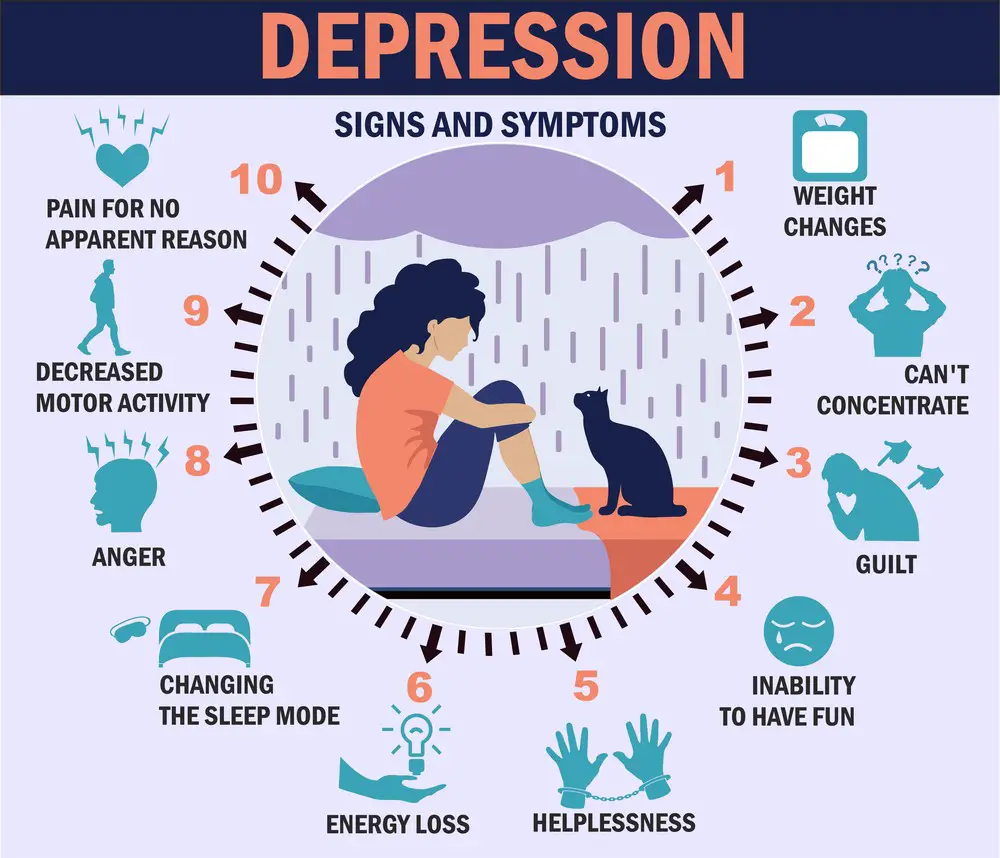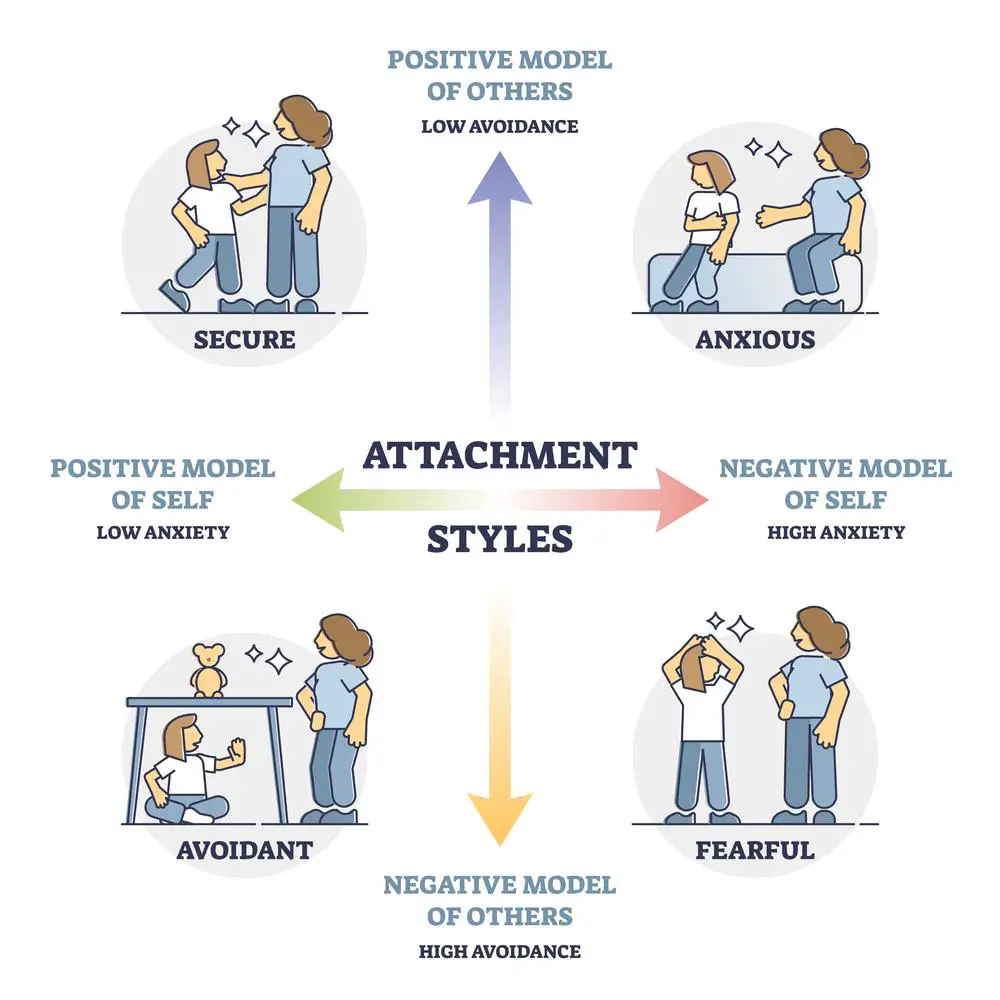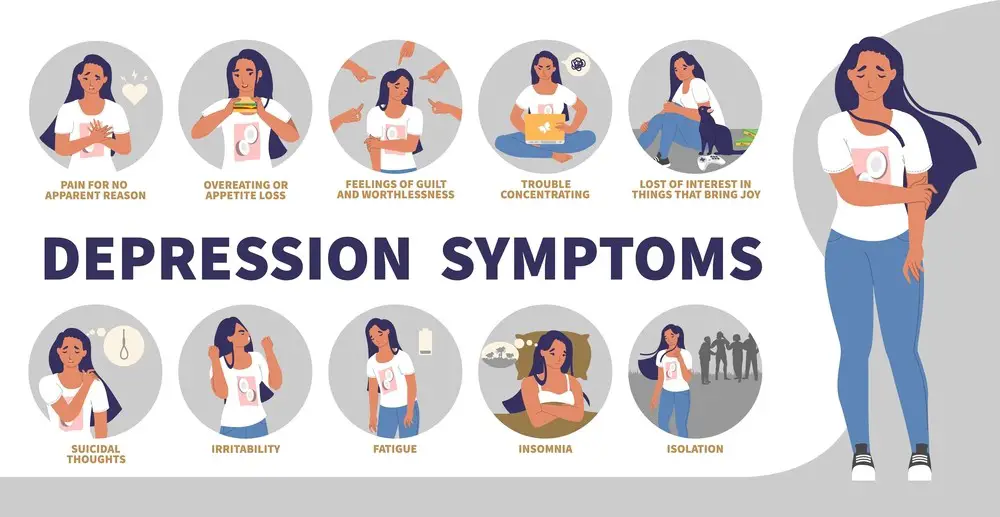As a BetterHelp affiliate, we receive compensation from BetterHelp if you purchase products or services through the links provided
Codependency and depression are complex emotional states that often intertwine, affecting individuals and their relationships. Codependency is a behavioral condition where one person enables another’s addiction, poor mental health, immaturity, irresponsibility, or underachievement. It typically arises within relationships and can create a dependency on the needs and behaviors of the other person. On the flip side, depression is a common and serious mood disorder characterized by a persistent feeling of sadness and loss of interest in activities that you once enjoyed. It can significantly impact your daily life, including how you think, feel, and handle activities like sleeping, eating, and working.
While codependency and depression are distinct conditions, they frequently occur together. If you’re struggling with codependency, you may find yourself caught in a pattern of putting other’s needs ahead of your own to the extent that it impacts your mental health. This could lead to feelings of worthlessness and sadness, an overwhelming sense of responsibility for the emotions of others, or a lack of self-care – all potential gateways to depression. Conversely, facing depression may lead you to seek out relationships where you can feel needed, which may nurture a codependent dynamic. Recognizing the signs of both codependency and depression is a crucial step toward seeking help and breaking the cycle.
Healthy relationships are all about balance and maintaining your individuality. If you find yourself in this cycle, don’t despair; there are strategies to regain your footing. Setting boundaries is essential for your mental health, and it involves understanding your limits and communicating them to others. Recovery involves recognizing harmful patterns, seeking support, and potentially engaging in therapy to address underlying issues. Remember, confronting these issues head-on is brave, and with the right support, you can nurture healthier relationships and improve your well-being.
Key Takeaways
- Codependency can negatively impact your well-being and is often linked with feelings of depression.
- Setting healthy boundaries is crucial for mental health and breaking the cycle of codependency.
- Recovery from codependency and depression involves recognizing patterns, seeking support, and perhaps therapy.
 Understanding Codependency
Understanding Codependency
Codependency is a complex emotional and behavioral condition. It often stems from a person’s past experiences and influences their current relationships.
Origins and Definitions
Codependency may originate from childhood, as you might learn to put others’ needs before your own to receive affection or avoid conflict. It’s often seen in families where there is a history of addiction or illness, and it can be considered a learned behavior. Psychologists note that while codependency isn’t officially classified as a personality disorder, it does contain elements of such conditions—namely, the persistent focus on the needs of others at the expense of one’s well-being.
- Key Traits: Putting others’ needs first, difficulty saying no, a need to control situations and outcomes.
- Common Misunderstandings: It’s not just about romantic partnerships; it can occur in any relationship.
Key Takeaway: Understanding codependency begins with recognizing its roots in childhood and its resemblance to certain personality disorder traits.
Common Traits and Behaviors
If you’re in a codependent relationship, you might find yourself constantly trying to please your partner or family member. This is often due to a deep-seated fear that your self-worth is tied to how much you can do for others. Common traits include:
- Low Self-Esteem: Belief that you’re not good enough or that your worth is measured by your ability to meet someone else’s needs.
- Caretaking: A solid inclination to take responsibility for others’ feelings and problems.
Key Takeaway: Your self-worth doesn’t depend on how much you care for others; recognizing your patterns can be the first step toward healthier relationships.
Signs of Codependency
Recognizing the signs of codependency can be challenging because it’s easy to confuse them with simply being caring or attentive. Pay attention to how often you:
- Experience discomfort when someone you care about isn’t happy, even due to their choices.
- Feel like you can’t be happy unless those around you are also happy.
- Lose sight of your needs because you’re too busy attending to others’.
- Feel responsible for the emotional state and well-being of someone else.
Key Takeaway: Awareness of these signs is crucial for addressing codependency and moving toward a more balanced and fulfilling relationship with yourself and others.
The Link Between Codependency and Depression
Codependent relationships can profoundly affect your mental health, often leading to depression. Understanding this link is crucial for healing and recovery.
Psychological Impact of Codependent Relationships
When you’re in a codependent relationship, your emotional state often hinges on another person’s behavior, leading to a damaging impact on your psychological health. This dynamic can sow the seeds of low self-esteem and hopelessness because you might measure your worth through another’s eyes, and your needs are often sidelined.
- Low self-esteem: You may feel you’re not good enough, reinforcing dependency.
- Hopelessness: A sense of powerlessness may emerge when your happiness is intertwined with someone else’s actions or well-being.
If you have a history of trauma, codependent relationships can be even more detrimental, possibly reigniting old wounds without providing the nurturing environment needed for healing. The guilt that often comes with codependency can keep you in a psychologically taxing cycle, unwilling to prioritize your own needs.
Key Takeaway: Your sense of self-worth and emotional independence can be significantly compromised in codependent dynamics.
 Symptoms of Depression in Codependency
Symptoms of Depression in Codependency
Depression in the context of codependency might manifest differently compared to depression on its own. Below are signs you might be experiencing depression due to a codependent relationship:
- Constant worry about your partner’s problems, often to the detriment of your health.
- Feeling responsible for your partner’s happiness leads to guilt when unhappy.
- Persistent feelings of sadness and emptiness, as you might be neglecting your emotional needs.
- Physical symptoms like changes in sleep patterns, weight, or other signs of illness that stem from stress and emotional turmoil.
It’s important to recognize these symptoms early, as they can exacerbate each other, fostering a declining spiral of mental health. If you notice such signs, seeking professional help can steer you toward reclaiming your independence and finding balance in your relationships.
Key Takeaway: Be aware of the unique symptoms of depression that can arise from codependent relationships, and consider seeking guidance for support.
Factors Contributing to Codependency
Understanding codependency involves looking at the threads that tie your past to your present relationship choices. Especially, it’s about the silent whispers of your upbringing that shape your bonds with others.
Family Dynamics and Childhood Relationships
The family unit is where you first learn about relationships. Suppose you grew up in a dysfunctional family where needs were often ignored or dismissed. In that case, you might have developed a habit of putting others’ needs above your own, a hallmark of codependency. Childhood relationships are a foundational puzzle piece in this dynamic. Here are some specifics:
- High-stress families where one or more members struggle with addiction or mental health issues can foster a sense of responsibility in children to keep the peace or manage emotions, leading to codependent traits.
- Emotionally destructive behaviors displayed by parents often lay the groundwork for a child to seek approval and validation through sacrificing their own needs.
Key Takeaway: If the reflections of your family’s past seem tangled with caretaking or emotional neglect, it may have set a stage for codependent patterns.
 Attachment Styles and Relationship Patterns
Attachment Styles and Relationship Patterns
Your attachment style dramatically influences how you connect with others as an adult. Formed in childhood, it either lays a path for healthy bonds or sets the scene for unhealthy relationships. Here’s how it shows up:
- An anxious attachment style can make you feel insecure in relationships, often resulting in clinginess or a fear-based need to please others.
- Conversely, an avoidant attachment style might make you feel the need to be overly independent to avoid close emotional connections, which, ironically, can still lead to codependent behaviors in relationships where you do get close.
Key Takeaway: Delve into your attachment style—it could tell you a lot about why you’re drawn into codependent relationships and how you might navigate towards healthier shores.
 Depression: Understanding the Depth
Depression: Understanding the Depth
Navigating through the complex landscape of depression is crucial for understanding its impact on mental health. You’ll find that getting to know the different types of depression and their symptoms can significantly empower you to seek appropriate help, whether for yourself or a loved one.
Types and Symptoms
Depression is not a one-size-fits-all condition; it manifests in various forms, each with unique symptoms. Here’s a snapshot:
- Major Depressive Disorder (MDD): You might feel persistent sadness, loss of interest in activities, and fatigue that lasts for at least two weeks.
- Persistent Depressive Disorder (Dysthymia): This is a chronic form of depression where you may experience low mood and energy over two years or more.
Symptoms to look out for include:
- Changes in sleep
- Shifts in appetite or weight
- Difficulty concentrating
- Feelings of guilt or worthlessness
- Unexplained physical pains
Remember, symptoms can vary in intensity and duration, but they all disrupt daily life.
Therapeutic Approaches
Regarding therapy, mental health professionals offer various approaches tailored to your needs. Let’s unpack a couple:
- Medication: Antidepressants can help balance brain chemistry and alleviate symptoms. It’s essential to have a clear discussion with a healthcare provider about potential side effects and the duration of treatment.
- Cognitive Therapy: This type of therapy aims to alter negative thought patterns that contribute to feelings of depression. It encourages you to challenge and replace these patterns with more balanced, positive thinking.
Other therapeutic approaches may include:
- Group therapy provides a community of support and understanding
- Mindfulness techniques assist you in staying rooted in the present moment
Therapy is often more effective when you feel a sense of empathy and compassion from your therapist, creating an environment where you can heal and grow.
Key Takeaway: Knowing the variations and symptoms of depression is paramount to seeking personalized treatment. Remember, reaching out for help is a sign of strength, not weakness.
 Setting and Maintaining Healthy Boundaries
Setting and Maintaining Healthy Boundaries
Establishing healthy boundaries is vital for your mental and emotional well-being. It requires understanding your limits and communicating them to others.
Defining Personal Space
It’s crucial to identify your physical and emotional limits. Consider what you can tolerate and accept in relationships, and recognize your individual needs and rights. For instance:
- Physical Space: You may prefer a handshake over a hug in greetings.
- Emotional Space: You might require time alone to unwind after social gatherings.
Key Takeaway: Recognizing your comfort zones in different aspects of life allows you to define your personal space.
The Role of Boundaries in Well-being
Healthy boundaries are essential for well-being. They allow you to:
- Practice self-care: Prioritize your needs without feeling selfish.
- Cultivate respect: When you respect your boundaries, others are more likely to as well.
- Take responsibility: You’re in charge of your happiness and must communicate your boundaries to maintain it.
Key Takeaway: Boundaries are a form of self-respect and signal to others how you expect to be treated.
Healing and Recovery Strategies
When addressing codependency and depression, incorporating effective healing and recovery strategies plays a vital role in fostering a healthier life.
Self-Care and Lifestyle Changes
Developing a self-care routine can significantly impact your mental health. Here are several strategies to get you started:
- Exercise: Regular physical activity boosts your mood by releasing endorphins. Aim for at least 30 minutes of exercise most days.
- Nutrition: Balanced meals can improve energy levels and overall well-being.
- Sleep: Prioritize 7-9 hours each night to help your mind and body recover.
Remember that small daily steps can lead to big changes over time.
Key takeaway: Prioritizing self-care helps you regain control and improve your mood and energy.
Support Systems and Therapy
Having a solid support system is essential for healing:
- Therapy: Working with a therapist can provide tailored strategies to manage depression and codependency.
- Support Groups: Groups like CoDA (Codependents Anonymous) offer a community that understands and supports your journey.
- Family and Friends: Lean on trusted loved ones for support; they can offer encouragement and companionship.
Utilizing these systems can make you feel less alone and more empowered to tackle life’s challenges.
Key takeaway: Accessing support provides additional tools and reaffirming that others are rooting for your recovery.
Support Systems: Roles and Impact
A well-built support system can be a lifeline, especially when you’re battling issues like codependency and depression. Such systems play a crucial role in providing emotional scaffolding and practical help.
The Influence of Social Support
Connecting with friends, family, or colleagues who offer social support enriches your life and provides a cushion against the hard knocks. When enveloped by a network of caring individuals, your journey through tough times often becomes more manageable. Here’s how:
- Empathy and Understanding: Having someone who listens and empathizes can validate your feelings and experiences.
- Encouragement and Affirmation: A healthy relationship within your support system means having cheerleaders who believe in your worth and abilities, nudging you forward.
Key Takeaway: Interactions filled with warmth and encouragement from your social network bolster your resilience against depression.
Finding and Engaging in Support Groups
Seeking out and becoming part of support groups can be a transformative step. Here’s why they’re beneficial:
- Shared Experiences: In these groups, hearing others’ stories can break your isolation, reaffirming that you’re not alone.
- Collective Wisdom: Members exchange strategies for coping and offer each other advice, pooling their collective wisdom for the benefit of all.
Key Takeaway: Diving into a support group provides a special space where mutual understanding flourishes, fostering an interdependent relationship that promotes healing.
 The Role of Therapy in Treating Codependency
The Role of Therapy in Treating Codependency
When wrestling with codependency, therapy can be your beacon of hope, offering you the strategies and support needed to chart a healthier, more autonomous course in life.
Different Types of Therapy
Individual Therapy: This is a one-on-one session with a mental health professional. It’s tailored for you, focusing on personal feelings, thoughts, and behaviors. This intimate setting can help uncover your codependent patterns and start working through them.
- Cognitive-Behavioral Therapy (CBT): Here, the goal is to reframe your thinking, swapping old patterns for new, healthier ones. CBT often includes exercises for you to practice between sessions.
- Dialectical Behavior Therapy (DBT): DBT combines CBT techniques with mindfulness practices. You’ll learn to manage emotions and improve relationships.
Psychodynamic Therapy: By looking into past experiences, a therapist helps you understand the roots of your codependence.
Group Therapy: You realize you’re not alone by sharing your journey with others. This type of therapy fosters a sense of community and shared learning.
- Support Groups: In a safe space, you swap stories, offer support, and grow alongside peers facing similar challenges.
- Educational Workshops: These groups provide knowledge about codependency and practical tools to deal with it.
Online Therapy: This flexible option lets you access therapy from anywhere, which can be a huge plus if you’re juggling a busy schedule or prefer the comfort of your own space.
Key Takeaway: There’s a variety of therapy types designed to meet your unique needs on your journey out of codependency.

The Role of the Therapist
A therapist acts as your guide, not just a listener. They bring expertise, tapping into evidence-based approaches to help you navigate your codependent behaviors.
- Understanding & Empathy: A good therapist understands what you’re going through and offers a judgment-free zone to explore feelings.
- Strategic Interviewing: Expect questions that get to the heart of the issue, encouraging you to reflect and recognize patterns.
Skills Building: Your therapist will teach you strategies to improve self-esteem and foster independence.
Accountability: By setting goals with you, a therapist helps keep your progress on track.
Boundary-Setting: They teach you to set healthy limits in relationships to prevent future codependency.
Key Takeaway: Your therapist is a partner in your healing process, tailoring their approach to help you break free from codependent patterns and live a more balanced life.
Navigating Relationships with a Codependent Partner
When you’re in a relationship with a codependent partner, understanding and addressing underlying issues is crucial. It’s about fostering a healthier dynamic where both of you feel respected and valued.
Understanding Enabling Behaviors
In a codependent relationship, one partner often unconsciously enables the other’s unhealthy habits, which might include addiction. Recognizing enabling behaviors is the first step toward change. Here’s what to watch out for:
- Excusing Negative Behavior: Making excuses for your partner’s actions to avoid conflict.
- Taking Over Responsibilities: Completing tasks that your partner should handle, preventing them from facing the consequences of their actions.
Key Takeaway: Spotting these behaviors allows you to address them constructively and set the stage for healthier interactions.
Building Interdependent Relationships
An interdependent relationship is the ultimate goal, where both partners support each other while maintaining their individual identities. To build this kind of relationship, consider the following strategies:
- Communicate Clearly: Discuss your thoughts and feelings openly and listen to your partner’s perspective. This promotes understanding and mutual respect.
- Set Boundaries: Clearly define what is acceptable and what is not. Enforcing these boundaries is vital for a mutually satisfying relationship.
- Encourage Independence: Support each other’s growth and pursuits outside the relationship.
Key Takeaway: By implementing these strategies, you can transform a codependent dynamic into a thriving, healthy relationship.
Confronting and Overcoming Barriers to Recovery
Breaking free from codependency and managing depression is a journey that starts with recognizing obstacles and working through them with determination. Here’s how.
Challenges in Recognizing Codependency
Many find it hard to admit that their relational dynamics may be unhealthy. You could be caught in a cycle where:
- Denial overshadows your ability to see the situation. You might think, “Our relationship doesn’t have those problems.”
- Shame keeps you from opening up to others, as you might feel it reflects poorly on you or your loved one.
- Lack of self-awareness means you might not even realize behaviors that suggest codependency.
Key Takeaway: Acknowledging the existence of a problem is the first step towards recovery.

Stigma and Seeking Help
The fear of being judged can be paralyzing:
- Stigma creates a barrier, making you feel like you’re the only one struggling or that seeking help is a sign of weakness.
- To build confidence, it helps to remember that reaching out is a sign of strength, not a failure.
Strategies to overcome stigma:
- Find a supportive peer group or community.
- Educate yourself and your loved ones about codependency and depression.
- Rehearse what you want to say before reaching out for help.
Key Takeaway: Seeking help is courageous and essential for healing; you’re not alone in this.
Advancing Beyond Codependency
Moving beyond codependency involves nurturing your self-esteem and gaining independence. It shifts your focus to building supportive relationships that allow you to maintain your sense of self.

Developing Autonomy and Self-Esteem
Autonomy is about making decisions and trusting in your ability to face life’s challenges. To bolster your self-esteem:
- Reflect on your accomplishments, no matter how small.
- Practice self-compassion; speak to yourself like you would to a good friend.
Key takeaway: Growing your independence enriches your self-perception.
Fostering Healthy and Fulfilling Relationships
A healthy relationship respects both parties’ autonomy and encourages individual growth. Here are ways to create such bonds:
- Communicate openly about your needs and desires.
- Celebrate each other’s successes without feeling threatened.
Pursuing fulfilling relationships also means asserting your boundaries and valuing your identity alongside others’.
Key takeaway: In healthy relationships, you can be your true self, which nurtures your well-being and the connection with your partner.
Frequently Asked Questions
Navigating the complexities of codependency and depression isn’t easy, but understanding how they intertwine is a significant step toward better mental health. Let’s address some pressing questions you might have.
How does codependency typically influence a person’s mental well-being?
When you’re in a codependent relationship, your self-esteem often tethers to the needs and behavior of someone else, which can lead to heightened stress and emotional turmoil. Remember, prioritizing self-care isn’t selfish; it’s necessary for your mental well-being.
Can overcoming codependency potentially alleviate symptoms of depression?
Absolutely. By establishing boundaries and cultivating a sense of individuality, you can reduce the feelings of entrapment that often contribute to depression. Breaking free from codependency means rediscovering your joy and peace.
What are some common fears associated with codependent relationships?
You might worry about being alone or believe you’re unworthy of a relationship that doesn’t require you to overextend yourself. These fears can keep you locked in an unhealthy cycle. Recognizing them is a brave first step toward change.
In what ways might codependency serve as a psychological coping strategy?
Codependency might develop as a way to handle past trauma or neglect by making you feel needed or preventing loneliness. But remember, coping strategies that once helped can become harmful if they prevent personal growth.
What are the underlying causes that lead to the development of codependent behaviors?
Causes often range from childhood experiences to patterns learned within the family. It may stem from past emotional neglect or from relationships that modeled these dynamics. Understanding the roots can empower you to plant new, healthier patterns.
How can recognizing the spiritual aspects of codependency contribute to personal growth and healing?
When you acknowledge the spiritual side of codependency, you open the door to deeper self-reflection and a connection to values that transcend your immediate relationships. It’s a pathway to discovering a more authentic and fulfilling version of yourself.
- 7 Ideas to Help You Relax and Unwind on a Family Vacation - April 27, 2025
- How Having Cybersecurity Protection Helps You Relax - April 25, 2025
- 8 Reasons Why Spending Time Outside Calms You Down - April 25, 2025
This site contains affiliate links to products. We will receive a commission for purchases made through these links.


 Understanding Codependency
Understanding Codependency Symptoms of Depression in Codependency
Symptoms of Depression in Codependency Attachment Styles and Relationship Patterns
Attachment Styles and Relationship Patterns Depression: Understanding the Depth
Depression: Understanding the Depth Setting and Maintaining Healthy Boundaries
Setting and Maintaining Healthy Boundaries The Role of Therapy in Treating Codependency
The Role of Therapy in Treating Codependency
